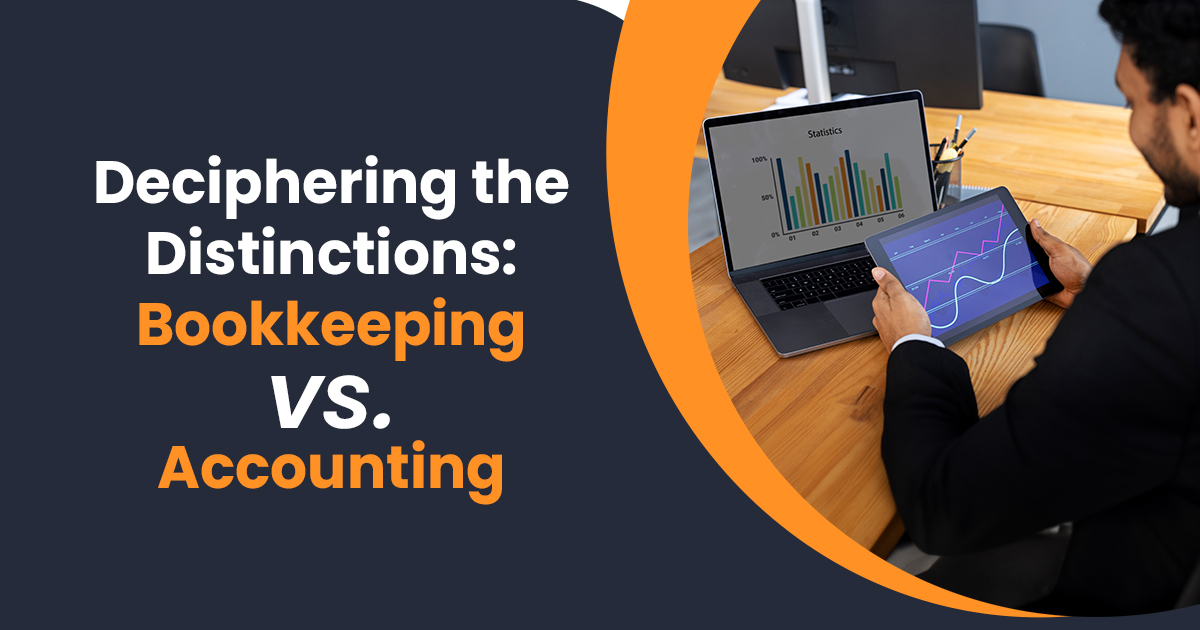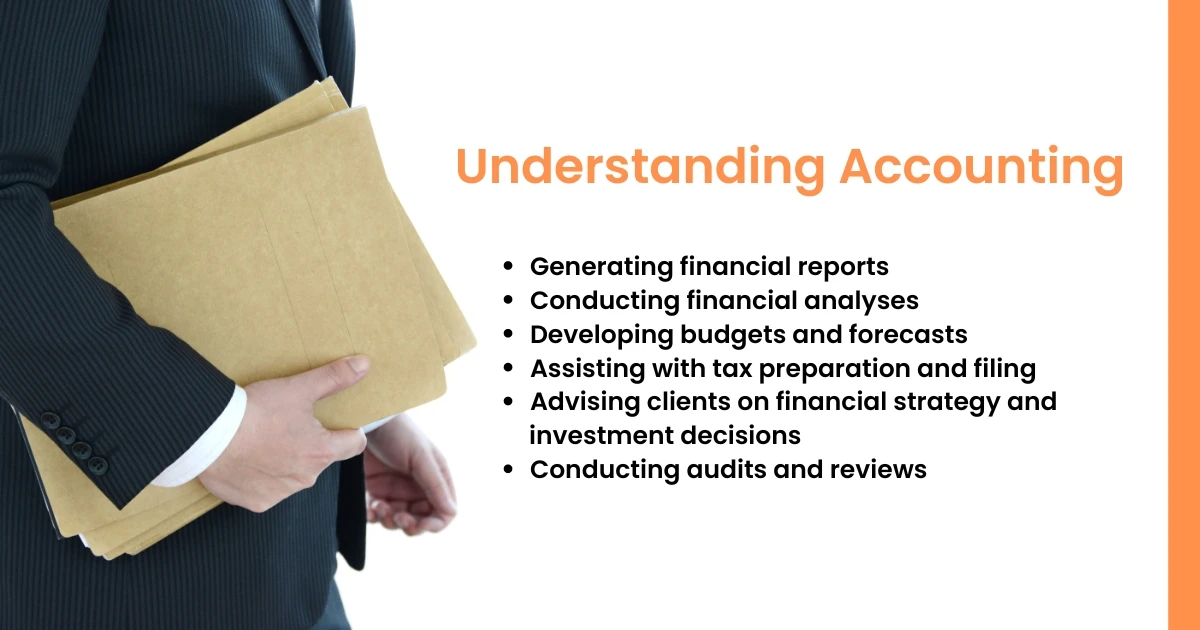
In the dynamic world of business, where every cent counts, bookkeeping and accounting take centre stage. Bookkeeping and accounting are responsible for maintaining a seamless flow of operations. In what ways do these roles differ, and what are their responsibilities?
Whether you are an experienced business owner looking for bookkeeping services in Brisbane or just starting out in business, it is imperative to understand the difference between bookkeeping and accounting.
The purpose of this blog is to demystify these financial processes, by exploring their distinct responsibilities, and impact on a business’s well-being. So, let’s explore the key differences, so you can make well-informed decisions to succeed.
Bookkeeping is the process of systematic recording and organising your company’s financial transactions in ledgers on a daily basis. The main objective is to track all information regarding key operating, investing and financial decisions through proper bookkeeping. And financial records need to be up-to-date, correct, and comprehensive.
Bookkeepers are important as they manage a business’s complete financial data. They help businesses to be aware of their current financial position. External stakeholders trust this reliable information to make better financial decisions.
A bookkeeper’s principal duty is to manage the daily financial transactions of a business.
Bookkeepers need to be equipped with certain skill sets to fulfil their responsibilities. They need to

Accounting is vital to business. It is the practice of interpreting, classifying, analysing, reporting and summarising finalising data. It aids every day financial procedures and analytics. It functions to provide relevant financial information to businessmen and investors.
Accountants are responsible for providing strategic financial advice to a business to help them achieve their goals. Their main responsibilities include:
Certain skills you need to have as an accountant are:
Do you own any bookkeeping services in Brisbane? And struggling to understand which one is important: bookkeeping vs accounting? We need to understand that bookkeeping ends where accounting starts. Let’s unravel the understanding regarding these terms.
Key differences are:
Bookkeeping | Accounting |
| Records and categorises daily payments and expenses in ledgers | Make financial statements |
| Sends customer invoices and records payments received | Analyse the cost of operations |
| Conduct bank reconciliations every month | Advise business owners during financial decision making |
| Generate monthly financial statements | Review and analyse financial statements |
| Process payroll | Financial health assessment and financial forecasting |
| Prepare the books for the accountant | Perform audits |
| Provide year-end financials and tax documents to the accountant. | Filing tax returns, conduct tax planning and provide tax advisory |
| Support function | Strategic function |
| Work with raw data | Work with both raw and processed date |
| Daily basis tasks | Monthly or yearly tasks |

To become a bookkeeper, a student needs to acquire certain certification in Australia:
When you decide to become an accountant, a beginner accounting practitioner needs to acquire:
Bookkeeping is vital for the health of any business. But misconceptions surrounding this critical task hinder the achievement of best results through this process.
Myth1 – Bookkeeping is only for large businesses
The truth is bookkeeping is vital to businesses of all sizes. When you maintain accurate financial records, the business can benefit from it.
Myth 2 – Bookkeeping is just entering random data
In bookkeeping, you need to track expenditure, manage invoices, and reconcile your accounts. Also give important insights to upgrade your business.
Myth 3 – Bookkeeping is complicated for small business
Small business owners need not ignore bookkeeping out of fear. When you maintain bookkeeping records, your small business will thrive. You can avoid complications with software like Xero and QuickBooks.
Small business accounting can confuse you with misinformation. But with dedication, you can achieve accounting for your small business accurately.
Myth 1 – Accounting and bookkeeping are same
Even though both the processes are related, their purposes are different in every day financial decision-making and for financial stability and growth.
Myth 2 – Remote Accounting services have reduced security
Remote accounting services use advanced data encryption and have security protocols to safeguard data.
Myth 3 – Accountants are important only during tax season
Accountants can add value to your small business all year round. Financial analysis, tax planning, budgeting done by accountants help businesses understand regulations and make real-time decisions.
As a bookkeeper or an accountant, being compliant with tax laws and regulations is absolutely crucial for a business’s financial health.
Bookkeepers play a critical role in carefully recording financial transactions and documenting financial records for compliance. Maintaining proper records, preparing for tax process, and smooth auditing is done by them.
Accountants take this process one-notch higher. They prepare tax returns and provide strategic tax planning advice. Also, making sure the business is tax-compliant, financial regulatory observer and reducing tax liabilities.
This will be helpful to know how a business builds a solid financial foundation, steer ahead with confidence and achieve financial success.
In 2024, the financial industry is witnessing several revolutionary trends for Brisbane bookkeeping services and the accounting firm in Brisbane. Evolving business landscape and transforming technological advancements are transforming the requirements of bookkeeping and accountants.
AI functions to enhance the working role of bookkeepers and accountants to upgrade their service standards. Though the role of AI is worrying many but with experience, passion, and resilience, the bookkeepers and accountants can explore and incorporate AI tools to achieve the financial goals.
Bookkeepers and accountants need to become technological literates. Through this digital transformation, they can expand their professional scope to plan, analyse and provide insights crucial for business expansion.
Bookkeepers and accountants need to be aware of cybersecurity threats by hackers. Understanding these risks, they can implement best ways to safeguard their work and their investors.
Although there is a shortage in talent, the rising demand for remote work is evident. With the use of technology and automation, finance professionals are showcasing credibility, profitability and efficiency. This opportunity needs to be welcomed and inculcate in developing the businesses.
Priority1’s Brisbane bookkeeping services provide professional bookkeeping solutions for your business needs. Carefully personalised solutions by a team of financial experts simplify your workload. Priority1 Bookkeeping focuses on accuracy, efficiency and confidentiality.
For students, interns, and beginner account practitioners, distinguishing between bookkeeping and accounting is crucial for a successful career in finance. Both bookkeeping and accounting are vital for a business’s financial health. Although they serve distinct purposes, they both provide valuable insights to expand the scope of profitability in business. Understanding these differences not only clarifies career paths but also enhances your ability to contribute effectively to a business’s financial health.
You need to understand how the role of bookkeeping services and an accounting firm will fit the purpose of a business – to maintain, stabilise and expand the business and achieve your goals. If you are looking for bookkeeping services, Priority1’s Brisbane bookkeeping services are here to help you achieve the best results for your business.
Stay updated with expert bookkeeping tips and insights! Subscribe now to receive updates directly in your inbox for your business.
* We never spam your email
38B Douglas Street, Milton QLD, 4064 Australia
Monday - Friday 09:30 AM - 05:30 PM
© 2025 All Rights Reserved.